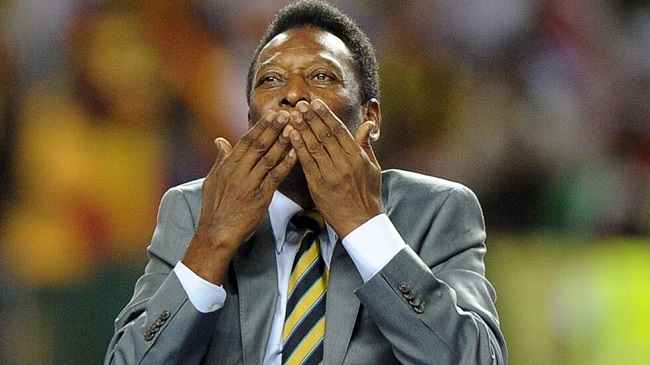At 17, Pele conquered the world
Pele burst onto the global stage at just 17 with dazzling goals as Brazil won the World Cup for the first time in Sweden in 1958.
“I have good and bad stories from World Cups. The ’58 World Cup was a dream. I was a kid. Nobody was expecting it. Nobody believed in us. I remember some reporters saying: ‘how can they take a 17-year-old kid to the World Cup finals,” Pele recalled in an interview with FIFA.
As ever on the football field, Pele’s timing was impeccable.
While the 1954 World Cup had been broadcast live to a small European audience, 1958 was shown more widely and far more people owned television sets.
Pele, who crowned his career 12 years later in Mexico in the first World Cup broadcast in colour, was the first football star to play his entire career in the TV era.
In 1958, Brazil under coach Vicente Feola were also innovating.
They embraced the 4-2-4 formation and adopted a detailed approach to every aspect of preparation and planning.
The federation assigned a psychologist, Joao Carvalhaes, to the squad. He tested the players and pronounced Pele “too infantile”.
“You may be right,” Feola replied. “But you know nothing about football and I’ve seen Pele play.”
Pele, nursing a knee injury, missed the first two group games, a 3-0 win over Austria and the first goalless draw at a World Cup against England.
He made his debut against the USSR in the final group match.
The brilliant and unpredictable winger Garrincha was also recalled after being left out of the first two group matches.
Veteran defender Nilton Santos is said to have led a delegation of players to see Feola demanding he change the team.
Their recall altered the complexion of a side which had only contained one black player in the opening game.
Youngest scorer
In the first three minutes, Pele and Garrincha hit the woodwork and Vava scored. Vava added a second after the break as Brazil won 2-0 and secured first place in the group.
Pele made history in the 66th minute of the quarter-final scoring the only goal against Wales to become, at 17 years and 239 days, the youngest scorer in a World Cup.
He controlled the ball with his back to goal and Mel Charles marking him closely, flicked the ball toward goal with his right foot, spun and poked a shot through a challenge by Stuart Williams and in off the far post.
It was a goal fit to win a World Cup quarter-final, but because all the quarter-finals kicked off at the same time and the technology meant only one game could be shown live, it was not seen at the time by the global audience.
Pele hit the last three goals as Brazil beat France 5-2 in the semi-finals, pouncing on two loose balls in the goalmouth for a pair of well-taken poacher’s goals and completing his hat-trick with a stinging volley.
Just Fontaine scored for the losers and went on to finish the tournament with 13 goals.
“When I saw Pele play, it made me feel I should hang up my boots,” Fontaine said later.
Pele made his mark in the final on a Rasunda Stadium pitch made slippery by rain.
Although his play, behind centre forward Vava, epitomised the all-round attacking role associated with the modern number 10, he had that shirt only by accident. Despite their careful planning, the Brazilians had neglected to submit squad numbers and were assigned them at random. Goalkeeper Gilmar, for example, wore three.
Sweden took a fourth minute lead. Pele struck the woodwork. Then Garrincha twice beat his men on the right and hit low crosses for Vava to tap in.
In the 55th minute, Pele scored the third with a memorable flourish.
With the hulking Sigge Parling at his back, Pele leaped and twisted to control a ball into the penalty area. By the time he landed Parling was behind him.
‘Quick thinking’
As Bengt Gustavsson lunged in, Pele opted not to shoot, instead flicking the ball over the defender’s head.
Shrugging off a bootful of studs in his thigh, Pele composed himself as the ball dropped, from a height of 3.2 metres, FIFA have calculated, leant forward and bounced a volley under goalkeeper Kalle Svensson.
“If I said I thought about it, I’d be lying,” Pele told FIFA. “It was a spur-of-the moment reaction, quick thinking. When I controlled it I was going to hit it first time but then I thought quickly and adjusted. One of the strengths in my life and in my football was my improvisation, to change at the last second.”
In the final minute, Pele rounded off another 5-2 win, with a looping header that finished a one-two he had started with a backheel.
At the final whistle, Pele wept as teammates hoisted him in the air.
“After the fifth goal, even I wanted to cheer for him,” said Parling.
Fans watching round the world cheered too. King Gustav VI Adolf of Sweden came down to the pitch to shake Pele’s hand. Football’s king had been crowned.
Source: AFP




